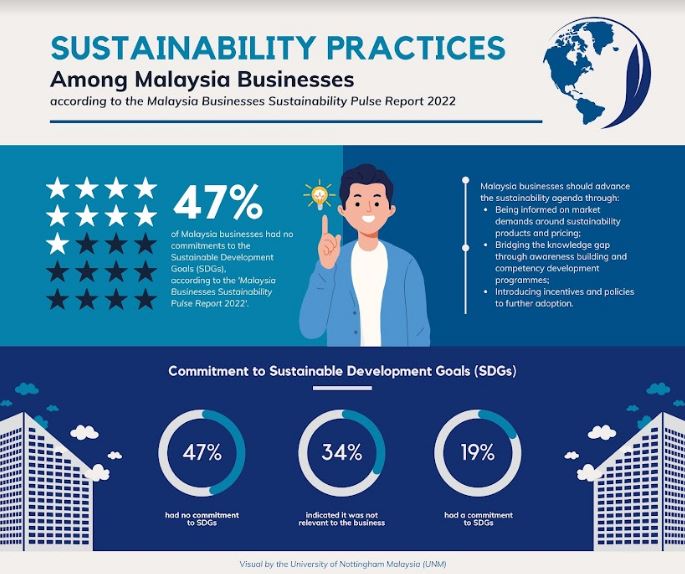Prioritisation of environmental, social and governance (ESG) positive behaviour in business offers an opportunity to tap into the multi-trillion green economy and is a risk mitigation measure. Yet according to the ‘Malaysia Businesses Sustainability Pulse Report 2022’, an alarming 45% of Malaysian companies did not allocate a budget for sustainability initiatives.
The report is a six-month multi-stakeholder research project in which the University of Nottingham Malaysia (UNM), through its Nottingham University Business School (NUBS), served as the knowledge partner working hand-in-hand with the United Nations (UN) Global Compact Network Malaysia and Brunei, along with other government agencies and private organisations.
“Through this report, we hope to build a better understanding of the landscape and drivers in sustainability practices and strategies among Malaysia’s private sector,” said Executive Director of UN Global Compact Network Malaysia and Brunei, Faroze Nadar.
Findings discussed the role of the Malaysian private sector on achieving a sustainable future, highlighting data on the perception and implementation of sustainability related practices within the private sector in Malaysia. The report collected survey responses from 261 businesses, including 88 public listed companies (PLCs), 21 multinational companies (MNCs), 14 Government-linked companies (GLCs) and 121 Micro, Small and Medium Enterprises (MSMEs).
One of the observations made was that less than 20% of respondents comprising Malaysian businesses had a commitment to the Sustainable Development Goals (SDGs) outlined by the UN. Meanwhile, 47% of the surveyed private sector indicated no commitments to SDGs with 34% indicating it was not relevant to the business.

The report also highlighted that the surveyed Malaysian corporations placed greater emphasis on sustainability practices compared to MSME respondents, likely due to greater stakeholder pressure in corporations to contribute to climate action, whilst MSMEs are more focused on the economical aspect of the business, amidst inflationary and global recession pressures. Regardless, all businesses big and small play an equally important role in addressing environmental concerns and should prioritise it in their planning and operations.
Prioritising The Environment
According to the report, 40% of the private sector respondents felt that environment concerned practices were not relevant to their businesses or that they were still considering adopting it. “The private sector in Malaysia tends to put more emphasis on advancing its social and governance aspects and while both are important, it is time we pay attention to the environmental aspect too. Businesses are very complex, and with numerous players in the supply chain, one is bound to have a carbon footprint,” said principal investigator and UNM Associate Professor of Management Accounting, Dr Hung Woan Ting.
Of the 17 UN SDGs listed, six fall directly under the environment umbrella, emphasising the importance of addressing environmental concerns for a sustainable future. “The results from this study give reason for concern as it shows a lack of awareness on how impactful business decisions can be,” said UNM Associate Professor of Auditing and Accounting, Dr Jayalakshmy Ramachandran. “Key decision makers should look to bridge this gap by building awareness amongst internal and external stakeholders.”
Steps To A Greener Future
Malaysian businesses need to look further into the future. Investing in long-term sustainable practices may not translate into profits now, but can benefit businesses in the long run, by influencing public opinion and ensuring a more resilient future for the business.
Local businesses should take proactive measures to advance the nation’s sustainability agenda, such as through being informed on market demands towards sustainability products and pricing, bridging the knowledge gap through awareness building and competency development programmes, and introducing incentives and policies to further adoption of sustainability practices. For example, industry players such as financial institutions, could focus on informing the business community about green financing options available in the market and on driving uptake of these products rather than introducing new offerings.
The report suggests that survey respondents were looking at sustainability as a risk-factor, rather than an opportunity. “By realising the potential of adopting concrete sustainability initiatives, businesses have an opportunity to benefit from the fast-growing green economy. Realising this will not only take Malaysia closer to achieving a sustainable future, but also help businesses maintain a competitive edge in the long run,” explained former Director of Research at NUBS Malaysia, Dr Avvari V Mohan.
The ‘Malaysia Businesses Sustainability Pulse Report 2022’ was released in conjunction with the British Malaysian Chamber of Commerce (BMCC) Malaysia Climate Action Week, and was led by UNM Associate Professor of Management Accounting, Dr Hung Woan Ting; working alongside UNM Associate Professor of Auditing and Accounting, Dr Jayalakshmy Ramachandran and former Director of Research at NUBS Malaysia, Dr Avvari V Mohan. Other contributors include MDEC, MATRADE, Bursa Malaysia, with support from Axiata Group Berhad, HSBC Amanah Malaysia Berhad, Sarawak Energy and Tata Consultancy Services Malaysia.
During the one-week event, Dr Jayalakshmy also spoke on a panel discussing ESG-engaged organisations. In their mission to nurture future leaders, UNM also championed a Youth Action Video Competition which encouraged high school students across Malaysia to submit videos of their self-started or school-led initiatives to address climate action.











